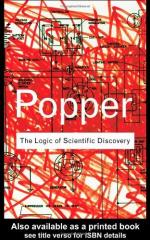
|
| Name: _________________________ | Period: ___________________ |
This test consists of 5 short answer questions, 10 short essay questions, and 1 (of 3) essay topics.
Short Answer Questions
1. In order to validate his theory, what does Popper categorize regarding frequency theory?
2. What principle does science presuppose?
3. What increases with the increase of the degrees of falsifiability?
4. What is determined by obscuring a logical connection between statistical and non-statistical interpretations, with regard to uncertainty theory?
5. What does Popper say about the number of possible events with regard to testability?
Short Essay Questions
1. Why, according to Heisenberg, can measurement not be a basis for prediction?
2. How is the physical basis for the uncertainty theory undermined?
3. Why does Popper feel that intersubjective objectivity must be applied to statistical statements?
4. Why does Popper dismiss cardinality in terms of giving meaning to a class of events?
5. What does Popper say about simplicity and the philosophers who emphasize its importance?
6. What does Popper suggest about hypothetical assumptions in his discussion on inductivists?
7. How does Popper feel traditional inductivists work?
8. What is the basic contribution that Popper makes to the logic of the theory of probability?
9. What is the basis of the wave theory used by Schrödinger?
10. Why does Popper feel the view of Wittgenstein, Schlick, and Feigl regarding simplicity misses crucial points?
Essay Topics
Write an essay for ONE of the following topics:
Essay Topic 1
Discuss what would be considered a good reason for a hypothesis to "drop out", as Popper puts it. Provide a situation or example of this situation.
Essay Topic 2
What three steps must be taken for a statement to be logically examined? Discuss each step and identify its place in this process as well as its role.
Essay Topic 3
Popper suggests that simplicity is used in many senses. Discuss these senses and provide support from the reading. What sense of simplicity does Popper feel is appropriate in science? Do you agree with Popper? Why or why not?
|
This section contains 824 words (approx. 3 pages at 300 words per page) |

|




